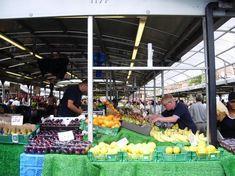
The Fresh Produce Consortium (FPC) has welcomed the new Markets 21 report which sheds light on the potential of traditional markets to contribute to local communities.
The FPC challenged both local and central government this summer to give more support to traditional markets and it welcomes the report Markets 21 published by the Retail Markets Alliance which gives more details of the value of thriving traditional markets and sets out the challenges which they face.
Traditional markets provide UK consumers with a wide range of fresh fruit and vegetables and cut flowers. With around 1,124 traditional retail markets across the UK this market sector is twice as large as other types of markets, yet “it can often be ignored when an evaluation of markets is carried out”, claims the FPC.
Nigel Jenney, chief executive of the FPC, said: “Central government’s agreement to champion markets is certainly promising and this report reveals the often unseen and significant potential for local markets to contribute positively within their communities both socially and economically.”
Independent retail markets are a key customer group for wholesale market traders and form an important element of the local economy. There is a significant inter-dependence between wholesale and retail markets, with wholesale markets, although representing just one per cent of total markets, accounting for 54 per cent of the total turnover for the sector. Traditional markets account for between 25-30 per cent of the fruit and vegetable market, which is valued at £8.27 billion overall in 2009.
Jenney added: “FPC is pleased to see that there is greater support for traditional markets with the Retail Markets Alliance and central Government’s welcome initiative. Traditional markets offer a variety of affordable flowers and fresh produce, grown both locally and overseas, in a wonderful vibrant setting and can have a positive future. We encourage local authorities to recognise the potential of traditional markets to bring a wide range of benefits to their communities and to help them achieve their targets for social inclusion, regeneration of inner urban areas and encouraging consumers to enjoy a healthy diet.”



